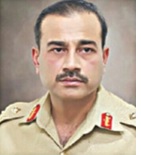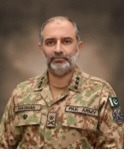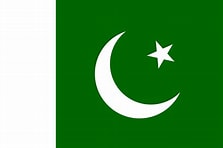On 29 November 2022, General Qamar Javed Bajwa shall relinquish the command of the most powerful organisation in Pakistan and the ninth largest army in the world. General Bajwa was appointed the Chief of Army Staff (COAS) by the then prime minister Nawaz Sharif on 29 November 2016. He secured another three-year extension from then prime minister Imran Khan in August 2019. The decision kicked up a controversy and Pakistan Supreme Court curtailed it to just six months. To oblige the general, who is said to have had helped Imran Khan to win 2018 general elections, his Government passed the Pakistan Army (Amendment Bill – 2020) in January 2020 to legislate the extension. After a brief bonhomie, General Bajwa’s relations with both of his benefactors, Nawaz Sharif and Imran Khan soured, resulting into political crisis and fall of their governments.
In Pakistan, though the president appoints the Services Chiefs, but the prime minister has the last word in the selection process. To set the ball rolling, the Ministry of Defence receives the dossiers of the senior-most Lieutenant Generals (Lt Gen), who have commanded a corps from the General Headquarters (GHQ), which then forwards them to the prime minister to decide upon the incumbent. The outgoing COAS also gives his informal recommendation to the prime minister about a particular general officer who should be his successor. The prime minister and his close advisors also weigh in the non-professional factors about the generals in question, such as loyalty and amenability towards the political establishment. But, that seldom works out. Once elevated to the rank of COAS, the incumbent realizes his position in the power matrix of the country and call the shots.
It may be a record of sorts that Nawaz Sharif as prime minister has appointed as many as five army chiefs, superseding a couple of generals to select his favorites, but everyone in the hour of need turned his back on him. At times, Nawaz Sharif also asserted himself on army, like compelling General Jehangir Karamat to put in his papers in October 1998. It is now his younger brother, Shahbaz Sharif who would be picking the eleventh COAS of Pakistan army. The name of next COAS was expected to be made public by mid-September, but the prevailing political situation in Pakistan has perhaps forced the prime minister to tread cautiously. The decision is unduly delayed.
The army chiefs in Pakistan normally look forward to get an extension to their tenure from the government. This practice has been rocking the army’s succession plan. General Bajwa shall be retiring after a six-year stint as COAS, resulting into a situation wherein many senior Lt Gens have retired and five of the COAS aspirants are from same batch sundered by their service numbers only.
There are two four-star general appointments that are falling vacant in November; the Chairman Joint Chief of Staff Committee (CJCSC) and COAS, which means two of the current aspirants, can be elevated to four-star general rank.
The probable for the COAS and CJCSC appointments are Lt Gen Asim Munir, Lt Gen Sahir Shamshad Mirza, Lt Gen Azhar Abbas, Lt Gen Nauman Mahmood, Lt Gen Faiz Hamid and Lt Gen Mohammad Amir. The last five are course mates from the 76th batch (September 1987).
 Lt Gen Asim Munir is the senior most amongst the contenders; currently serving as the Quarter Master General at the GHQ. He was commissioned in the Frontier Force Regiment in April 1986. He held the appointment of Director General Inter Services Intelligence (DG ISI) for a brief period of eight months before being appointed as General Officer Commanding (GOC) XXX Corps (Gujranwala). Lt Gen Munir has been Director General Military Intelligence (DGMI) at GHQ. He was GOC, Force Command Northern Areas under the present COAS, when he was GOC X Corps. He is set to retire from the service on 27 November. He remains in contention for promotion, in case the government goes by the seniority and appoints him as CJCSC or COAS before 27 November.
Lt Gen Asim Munir is the senior most amongst the contenders; currently serving as the Quarter Master General at the GHQ. He was commissioned in the Frontier Force Regiment in April 1986. He held the appointment of Director General Inter Services Intelligence (DG ISI) for a brief period of eight months before being appointed as General Officer Commanding (GOC) XXX Corps (Gujranwala). Lt Gen Munir has been Director General Military Intelligence (DGMI) at GHQ. He was GOC, Force Command Northern Areas under the present COAS, when he was GOC X Corps. He is set to retire from the service on 27 November. He remains in contention for promotion, in case the government goes by the seniority and appoints him as CJCSC or COAS before 27 November.
Lt Gen Sahir Shamshad Mirza hails from the infantry’s Sind Regiment. Presently, he is commanding X Corps (Rawalpindi), charged with managing operations along the Line of Control (LoC) with India. From 2015-2018, Lt Gen Mirza was Director General Military Operations (DGMO) under General Raheel Sharif and directed counter-terrorism operations against the Tahreek-e-Taliban Pakistan (TTP) in North Waziristan. Thereafter, he was sidestepped as Chief of General Staff (CGS) at GHQ under the present COAS. His experience in dealing with restive Khyber Pakhtunkhwa and LoC should bolster his chances.
(Rawalpindi), charged with managing operations along the Line of Control (LoC) with India. From 2015-2018, Lt Gen Mirza was Director General Military Operations (DGMO) under General Raheel Sharif and directed counter-terrorism operations against the Tahreek-e-Taliban Pakistan (TTP) in North Waziristan. Thereafter, he was sidestepped as Chief of General Staff (CGS) at GHQ under the present COAS. His experience in dealing with restive Khyber Pakhtunkhwa and LoC should bolster his chances.
 Lt Gen Azhar Abbas is also an infantry officer from the Baloch regiment like the present COAS General Bajwa. Currently, he is serving as CGS at the GHQ. Lt Gen Abbas has been the GOC of X Corps and credited for reviving ceasefire agreement (2003) with India along the LOC. He has been commandant of the Infantry School, Quetta and has commanded 12 Infantry Division (Muree). By faith, he is a Shia Muslim and in a Sunni dominated Islamic nation his chances of promotion to the rank of COAS or CJCSC may be impacted. Last time, Pakistan armed forces had Generals Musa Khan and Yahya Khan, who were Shias, as commander-in-chief in 1958 and 1966 respectively. However, his elevation to the rank of COAS can improve relations with Iran, but in India centric threat perception, such weightage is unlikely to matter.
Lt Gen Azhar Abbas is also an infantry officer from the Baloch regiment like the present COAS General Bajwa. Currently, he is serving as CGS at the GHQ. Lt Gen Abbas has been the GOC of X Corps and credited for reviving ceasefire agreement (2003) with India along the LOC. He has been commandant of the Infantry School, Quetta and has commanded 12 Infantry Division (Muree). By faith, he is a Shia Muslim and in a Sunni dominated Islamic nation his chances of promotion to the rank of COAS or CJCSC may be impacted. Last time, Pakistan armed forces had Generals Musa Khan and Yahya Khan, who were Shias, as commander-in-chief in 1958 and 1966 respectively. However, his elevation to the rank of COAS can improve relations with Iran, but in India centric threat perception, such weightage is unlikely to matter.
Lt Gen Nauman Mahmood is also from the Baloch regiment, credited to have produced four out of previous six COAS hailing from infantry. He has commanded XI Corps (Peshawar) and 7 Infantry Division (North Wajiristan). Lt Gen Mahmood has served at the ISI as Director General (Analysis). He has been Inspector General of Communications & Information Technology at the GHQ. Presently, Lt Gen Mahmood is President of the National Defence University, Islamabad. Considered a dark horse, he can upset the chances of the frontrunners, if Shahbaz Sharif is looking for a safe bet.
COAS hailing from infantry. He has commanded XI Corps (Peshawar) and 7 Infantry Division (North Wajiristan). Lt Gen Mahmood has served at the ISI as Director General (Analysis). He has been Inspector General of Communications & Information Technology at the GHQ. Presently, Lt Gen Mahmood is President of the National Defence University, Islamabad. Considered a dark horse, he can upset the chances of the frontrunners, if Shahbaz Sharif is looking for a safe bet.
 Lt Gen Faiz Hamid was commissioned into Baloch regiment. In last one year, Lt Gen Hamid has been reshuffled twice. In August 2022, he took over the command of XXX Corps (Bahawalpur), before that he was the GOC of XI Corps (Peshawar) from November 2021 to August 2022. Lt Gen Hamid has had two tenures at the ISI, the last one as DG ISI (June 2019-October 2021). Things were going well for him till as DGISI he openly hobnobbed with Taliban (Haqqani faction) in Afghanistan, jeopardizing fragile US-Pakistan relations. He was abruptly removed from the post. Seen as pro-Imran and with Imran Khan breathing fire at the Shahbaz government, army and US, his chances of promotion appear nixed.
Lt Gen Faiz Hamid was commissioned into Baloch regiment. In last one year, Lt Gen Hamid has been reshuffled twice. In August 2022, he took over the command of XXX Corps (Bahawalpur), before that he was the GOC of XI Corps (Peshawar) from November 2021 to August 2022. Lt Gen Hamid has had two tenures at the ISI, the last one as DG ISI (June 2019-October 2021). Things were going well for him till as DGISI he openly hobnobbed with Taliban (Haqqani faction) in Afghanistan, jeopardizing fragile US-Pakistan relations. He was abruptly removed from the post. Seen as pro-Imran and with Imran Khan breathing fire at the Shahbaz government, army and US, his chances of promotion appear nixed.
In an infantry dominated list of the probable, Lt Gen Mohammad Amir is a surprise. He was commissioned into  the Regiment of Artillery. Presently, he is commanding XXX Corps in Gujranwala. Lt Gen Amir has been the Adjutant General at the GHQ. He was GOC of 10 Infantry Division in Lahore from 2017-18. He has served at the General Bajwa’s secretariat as Director General Staff Duties. From 2011-2013, Lt Gen Amir was the Military Secretary to then President Asif Zardari. If his proximity to present COAS and acquaintance with Asif Zardari works, he could be a strong contender for the top job or the post of CJCSC.
the Regiment of Artillery. Presently, he is commanding XXX Corps in Gujranwala. Lt Gen Amir has been the Adjutant General at the GHQ. He was GOC of 10 Infantry Division in Lahore from 2017-18. He has served at the General Bajwa’s secretariat as Director General Staff Duties. From 2011-2013, Lt Gen Amir was the Military Secretary to then President Asif Zardari. If his proximity to present COAS and acquaintance with Asif Zardari works, he could be a strong contender for the top job or the post of CJCSC.
Of late, the political establishment has been critical of Pakistan army. Imran Khan after his ouster from the government in April this year has been criticizing army openly. The next incumbent will have an onerous task of reinstating the hold of army in the country. The relations with Afghanistan have plummeted and the TTP posing a challenge in the Waziristan. A ray hope is seen in the improved US-Pak relations cultivated by the outgoing COAS General Bajwa.
There are a few permutation combinations prime minister Shahbaz Sharif can look at before taking the most important decision of his political career. Assuming Lt Gens Azhar Abbas, and Faiz Hamid are not favorites and prime minister wants to go by the service seniority Lt Gens Asim Muneer and Sahir Shamshad Mirza could be appointed as CJCSC and COAS respectively. If Lt Gen Asim Muneer is overlooked, Lt Gens Sahir Shamshad Mirza and Mohammad Amir could be considered for COAS and CJCSC. Considering the safe bets, if a nudge from Pakistan People’s Party (part of ruling coalition in Shahbaz government) works Lt Gen Mohammad Amir can emerge as COAS and Lt Gen Nauman Mahmood as CJCSC.









The first name on the list is of the three star finally elevated to four star Chief of Army Staff. The second name is of the three star elevanted to Chairman Joint Chiefs of Staff Commitee. Good insight by the author
May I simply say what a relief to uncover a person that genuinely understands what theyre discussing on the internet. You definitely realize how to bring an issue to light and make it important. A lot more people ought to read this and understand this side of your story. I cant believe you are not more popular because you definitely possess the gift.